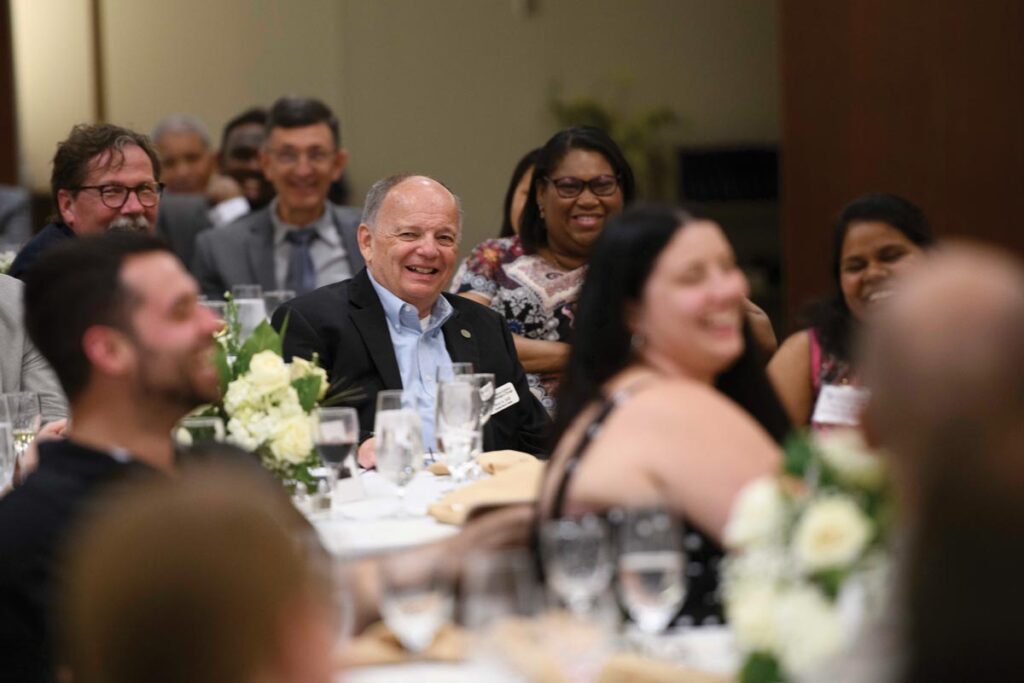Leadership in a Time of Change

LSTC Board Chair Terry Goff: “I have always regarded serving in church leadership as a natural response to the call of action associated with faith”
In 2018, Terry Goff was wrapping up service on the ELCA’s Central/ Southern Illinois Synod Council when a new opportunity arrived. The synod’s bishop, Reverend John Roth, asked Goff if he would consider becoming the Synod representative on the board of directors for the Lutheran School of Theology at Chicago.
Then newly retired, Goff saw this role as an opportunity to leverage the wealth of experience and skills he had earned in corporate America and various leadership positions within the Church and immediately embraced the idea.
“I have always regarded serving in church leadership as a natural response to the call of action associated with faith,” said Goff. “I’ve been on church councils, served on a program cabinet for Lutheran Social Services of Illinois, and in other service roles in congregations since I was 17. It’s just something that has become a natural part of my life.”
Goff’s Lutheran roots trace back to his maternal grandmother of German descent. Although he was baptized as an Episcopalian, during his eighth-grade year a family relocation back to his hometown of Peoria in 1962 prompted Goff’s parents to seek out the local Lutheran church. That year, Goff was confirmed into the Lutheran faith at Grace Lutheran Church, a predecessor congregation of today’s Grace and Peace Lutheran Church, where he remains a member.
Growing up in central Illinois, Goff attended the University of Illinois at Springfield and Bradley University in Peoria, where he spent nearly the first decade of his professional career in broadcast journalism. Goff says having the foundation of his career begin as a street reporter, assignment editor, and producer for the evening news broadcast at a local network-affiliate television and radio station gave him invaluable skills, experiences, and a mindset that set the stage for his future endeavors.
“You don’t think of Peoria as the hub of international communications, and it isn’t, but there is that old saying about Peoria, ‘Will it play in Peoria?’ It dates back to the vaudeville era and was popularized by Bob Haldeman from Nixon’s administration because, at the time, Peoria was a fairly accurate test market for the nation.”
Ironically, Peoria became a test market for Goff, too. There, he honed the skills that prepared him for leadership roles and enabled him to make a meaningful impact on the organizations and communities he served throughout his career.
In 1978, Goff joined Caterpillar, a global leader in heavy machinery and power systems manufacturing, where he quickly discovered that his background in communications and talent for analysis and strategic thinking were valuable assets that allowed him to excel in a Fortune 500 company over a remarkable 37-year career.
Caterpillar opened new horizons for Goff, traveling him worldwide to work in various positions, from advertising and international financial risk mitigation to managing the company’s power systems business with the oil and gas industry and overseeing their commercial engine business in Japan. During one of his job stints at Caterpillar, Goff lived in Hong Kong for 11 years, where he served as chair of the board for the top-ranked Hong Kong International School.
Through his global work travel and working with people in different nations and cultures at every level, Goff says that he gained an invaluable perspective on diverse cultures and societies and the importance of understanding the global landscape and what the people of the world have to bring to industry to increase the quality of life for everyone.
Now, as the chair of LSTC’s Board of Directors and liaison to LSTC’s Foundation’s Board, Goff draws from the diverse tapestry of his experiences to help steer the seminary through a period of transformation. As the needs of the Church change, Goff understands that LSTC must change, too.
“Traditional congregations face challenges with demographic changes and evolving community needs,” says Goff. “For churches to thrive, they must embrace a broader mission that goes beyond traditional roles of worship and education. Listening to the community’s needs is critical to this transition.”
For LSTC to thrive in the future, Goff says it must be willing to face the challenges ahead and move beyond the traditional paradigms that conceived it to become an intellectual and spiritual knowledge hub equipping leaders to serve in a complex, dynamic, and global society. While remaining theologically and scripturally based, LSTC should adapt to new realities and provide students with the tools to excel in these changing environments.
One challenge Goff and other LSTC board members have taken on recently is related to the seminary’s Reparations Initiative. In April 2023, the LSTC Board of Directors Executive Committee approved a resolution to establish a Reparations Task Force to examine and propose a reparations plan for the seminary to begin next year.
Since that time, the task force, which includes President James Nieman as support staff, and board members Morgan Gates (task force convener), Terry Goff (board chair), Greg Lewis (board vice-chair), and Kristi Ferguson (immediate past board chair), has been meeting to explore the issue and to create a proposal for the seminary’s initiative based on what they learn.
“Challenges in and of themselves are not easy or comfortable,” says Goff, “but the willingness to face up to them, consider how you might respond to them, consider what is needed in society and the community by listening, not telling, but by listening to what populations and people say they need as opposed to sitting in the ivory tower and telling them what they may need, I think is core to LSTC facing the future and thriving.”